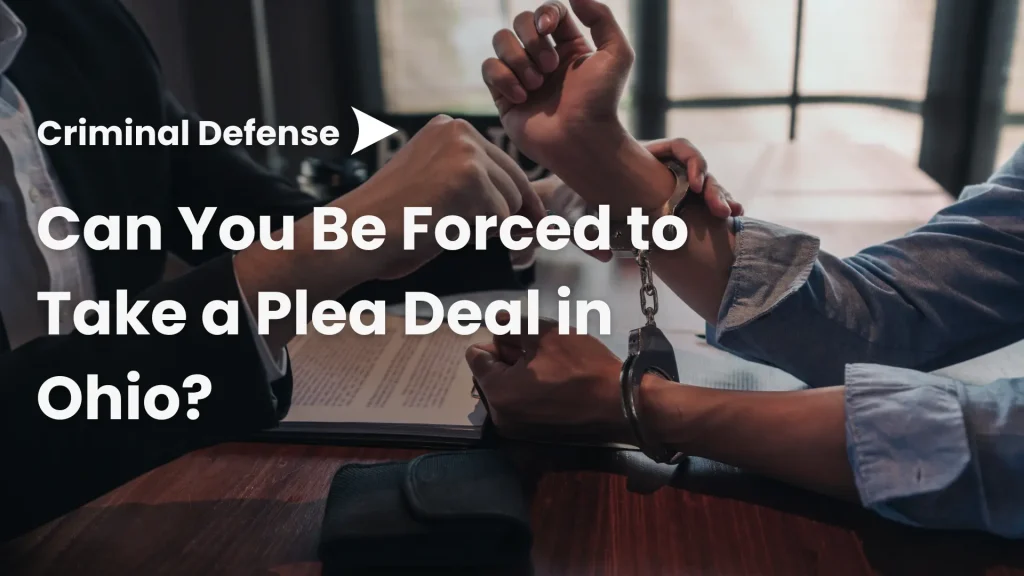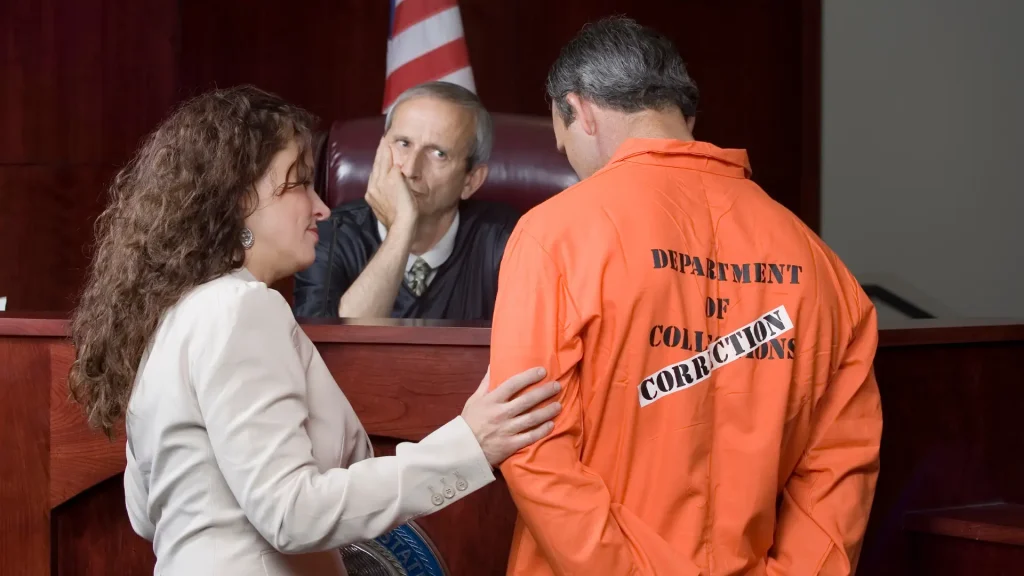Posted on Sunday, September 15th, 2024 at 4:23 pm

Many criminal cases in Ohio end in a plea deal, in which a defendant agrees to plead guilty to one or more charges in exchange for a reduction or dismissal of other charges or a favorable sentencing recommendation from the prosecutor. Prosecutor’s offices and trial judges favor plea agreements as an efficient way to resolve criminal charges. However, can a defendant be forced to take a plea deal?
Although plea agreements have various pros and cons for defendants, prosecutors cannot coerce or pressure defendants into pleading guilty. Defendants have a constitutional right to a jury trial where the government must prove the defendant’s guilt for the charged offense beyond a reasonable doubt. As a result, you do not have to take a plea deal in Ohio when you may have defenses or case strategies to fight your charges and seek a more favorable outcome than the prosecution offers.
Understanding Plea Agreements
In a plea agreement, also called a plea deal or plea bargain, a defendant agrees to plead guilty to one or more criminal charges in exchange for the government recommending a specific sentence or sentencing range. The prosecution may also agree to dismiss or reduce the grading of one or more charges in exchange for the defendant’s guilty plea to other charges. Although the trial court has complete discretion over what sentence to impose on a defendant, courts frequently rely on the prosecution’s sentencing recommendation when the prosecution and defendant have a plea agreement. Sometimes, the prosecution may agree not to seek an enhanced sentence.
Prosecutors frequently seek plea agreements to avoid the time and expense of a trial. They offer favorable sentencing recommendations for defendants who agree to plead guilty and eliminate the need for a trial. However, defendants may only enter a plea deal and plead guilty if they committed the crime and admit guilt in open court. A trial court will not accept a defendant’s guilty plea or a plea agreement unless the defendant admits to each element of an offense.
A plea agreement may impose other obligations upon a defendant in exchange for a favorable sentencing recommendation from the prosecution. For example, a defendant may have to cooperate with prosecutors in other criminal cases, such as testifying against co-defendants.
By pleading guilty, a defendant typically waives their right to appeal their conviction and sentence except for a limited range of issues. The plea agreement may specify what issues a defendant may raise on appeal or during collateral proceedings, such as the legality of the conviction/sentence or ineffective assistance of plea counsel.
Pros and Cons of Plea Deals
Entering a plea deal can have various benefits for a defendant facing criminal charges, such as:
- A plea agreement may allow a defendant to avoid the maximum sentence possible under their charges, as prosecutors typically recommend more favorable sentences in exchange for a defendant’s guilty plea
- Plea agreements avoid the time and expense of trial, which can help minimize a defendant’s legal costs
- Plea deals allow defendants to resolve their charges more quickly so they can move forward with their lives
However, accepting a plea deal can have its drawbacks, including:
- A plea deal significantly limits a defendant’s right to appeal their conviction and sentence
- Entering a guilty plea means giving up the right to assert one’s innocence or to present a defense
- Plea agreements let law enforcement investigators off the hook for violations of a defendant’s rights, such as conducting an unlawful search, which the defendant could use to exclude evidence, weaken the prosecution’s case, and seek a dismissal or acquittal
Do You Have to Accept a Plea Deal
Prosecutors favor resolving criminal cases through plea agreements since they resolve cases without a trial, conserving the prosecutor’s office’s resources and getting cases off prosecutor’s plates. As a result, prosecutors may pressure defendants into accepting a plea deal by overstating the strength of the government’s case or threatening to seek maximum penalties if the defendant gets convicted. However, a defendant does not have to accept a plea deal under any circumstances, nor can prosecutors force a defendant to agree to a plea deal. A defendant has the right to a trial where the prosecution must prove every element of the defendant’s charge(s) beyond a reasonable doubt. Prosecutors and trial courts cannot punish defendants for exercising their constitutional rights to a jury trial.
Pressures Defendants Face to Plead Guilty

Defendants may face significant pressure to plead guilty by multiple parties. Prosecutors may pressure defendants to plead guilty to avoid the time and financial cost of preparing a case, taking criminal charges to trial, and avoiding the risk of losing the case at trial. Judges sometimes prefer defendants to plead guilty to get cases off their dockets. Family members may also pressure loved ones facing criminal charges into pleading guilty to minimize embarrassment or humiliation from having a loved one facing criminal prosecution or to move on from a loved one’s criminal case.
Due to the pressure a defendant faces from the criminal justice system and even from loved ones, a defendant may choose to accept a plea deal that does not serve their best interests. Defendants should have experienced, independent legal counsel who can review the facts of their case and the terms of plea deals proposed by the prosecution to advise them whether an offered plea deal represents the best option for obtaining a favorable resolution to criminal charges.
Contact a Criminal Defense Lawyer Today to Discuss Your Rights and Options When Offered a Plea Deal
When you face criminal charges, prosecutors may offer you a plea deal. However, you can best protect your rights and interests by consulting an experienced criminal defense attorney to determine whether a plea deal represents the best way to resolve your charges. Call Moermond & Mulligan, LLC today at (513) 421-9790 for a free, confidential consultation with a seasoned Ohio criminal defense lawyer to discuss the prosecution’s offered plea deal and your rights and options in your case. Our attorneys have the legal knowledge and have a proven track record of success. We can help you with your case.
Related Posts:
Signs You’re Under Police Investigation in Ohio
Written By: Moermond & Mulligan, LLC
Last Updated: 02-11-2025